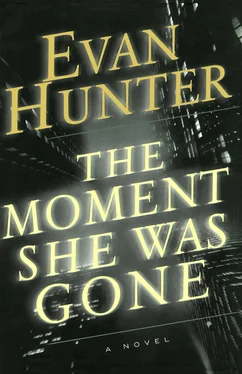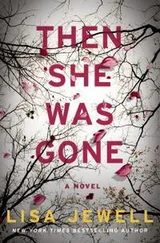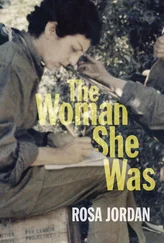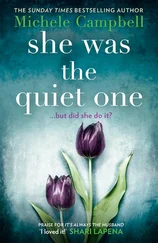“If we’re to believe Maggie.”
“Yes, well, I believe her.”
“If you believe her so much, you shouldn’t have divorced her.”
“Mom, I think Annie is a danger to herself and to others. I think we should call the police.”
“No.”
“Yes, before she...”
“We should have called them seventeen years ago,” Augusta says.
My mother turns to her, puzzled.
“When she stole the thousand bucks from us.”
“That is a lie!”
“It’s the truth, Mom,” Aaron says. “Kelly saw her taking the money.”
“Kelly,” my mother says, dismissing her.
“My daughter. Mom.”
“Your daughter, ” she says, dismissing her yet again. “You bring me two grandchildren from...”
She shakes her head.
“Never mind,” she says.
“No, let’s hear it,” Augusta says. “Two grandchildren from where, Mom?”
“From who knows where? Instead of...” She cuts herself off again. “Never mind,” she says again.
“Instead of what, Mom?” Aaron asks. “Instead of having two kids who might turn out to be nuts?”
“I do not have...”
“I’m talking about the twins Augusta was carrying. This was after Georgia, we knew all about Georgia. Do you know what the odds would have been?”
“I don’t want to hear odds, save your odds.”
“If either of your parents has schizophrenia, your chances of getting it are ten percent,” Aaron says.
“Oh? Do you and Augusta have schizophrenia?”
“Mom, we knew Annie was nuts! The odds on...”
“Enough with the odds!” my mother says. “What time does the first race start?”
“She doesn’t believe anything we say,” Augusta says. “What’s the use, Aaron?”
“That’s right, Miss, what’s the use? I don’t believe my daughter stole money from you, and I don’t believe she went after Margaret with a hammer, either. Margaret tripped and fell, that’s how she got the bruise.”
“I’m calling the police,” I say, and start for the phone table.
“You want them to lock her up, is that it? You want them to lock up a person who’s as sane as you or I? My daughter has never in her life tried to hurt anyone.”
“She hit Maggie with a hammer,” I say, more evenly this time, stressing each word.
“No, she did not. Margaret probably fell. They’d been drinking wine, she probably...”
“No, Mother, Annie hit her with a fucking hammer!”
“Don’t you dare use that language in my house!” my mother yells, and for a moment I fear she will slap me, but instead she clenches both hands, and turns away from me. I watch her silent struggle for control. She is trembling with rage, her knuckles white where she presses her hands together, her thin shoulders shaking. All at once, she seems so very small and slight. I almost want to take her in my arms and comfort her. She shakes her head, as if suspecting I might try to embrace her, and warding off any such motion beforehand.
“If you all want to believe Annie’s crazy, fine,” she says, “believe it. But I don’t think it’s wrong for a mother to help and encourage her own daughter...”
“You haven’t helped her,” I say.
“I’ve done everything I know how...”
“You’ve enabled her, is what you’ve done. She needs real help.” My mother is shaking her head. I am talking to a stone wall. “Mom, she hears voices! ” I say. “She talks to voices. You said so yourself.”
“I said she was murmuring, mumbling, whatever. That’s what people do when they’re thinking out loud. What’s so terrible about that? Don’t you ever think out loud?”
“No, never, Mom.”
“Never,” Augusta says.
“Don’t you ever talk to yourself?”
“Never.”
“Well, I do.”
“That’s not the same as hearing things.”
“Hearing things is just another way of saying talking to yourself. You talk things over with yourself. You pose a question, you answer it. That’s not so unusual. Everybody does it.”
“I don’t,” Augusta says.
“I don’t, either.”
“Inside your head is what I’m saying. Even if Annie did hear someone talking to her, that doesn’t make her crazy. She heard a voice, she talked back to it. That isn’t so unusual you know. I don’t know why you’re making such a big deal of it. If Annie ran away, it wasn’t because any voices told her to. It’s only because I wouldn’t give her the money.”
“What money?” I ask at once. “What are you talking about?”
“The fifty thousand dollars.”
“Fifty...”
“It’s my fault she’s gone,” my mother says. “I told her to leave.”
“What!”
“I told her to go, I told her to get out.”
“Oh, Jesus, Mom.”
“Don’t look at me that way! Do you know what living with her is like? You try it sometime! You try living with a goddamn lunatic! ” she shouts, and suddenly she is in tears. “You try... you try...” she stammers, and then collapses onto the sofa again, and covers her face with her hands. “I’m sorry,” she says, “oh dear God, I’m so sorry. I should have given her the money, oh please God, let her be all right, I was only trying to help. But it... it... I didn’t know what to do. I just... didn’t know what to do anymore. All at once, it... it got to be... too much for me... all at once. I... just couldn’t bear it any longer. You don’t know what it was like. You don’t know what it was like.”
Aaron sits beside her and puts his arm around her.
Weeping into his shoulder, she tells us what it was like.
At first, she thinks Annie is realty okay.
Really.
Before her “incarceration in Sicily,” as Annie refers to it, she acquired a deep tan and is now in remarkable physical condition from walking and swimming...
“And falling down mountains,” my mother adds jokingly, and Annie even finds this funny.
It would appear that whatever medication they prescribed for her in Italy has had a calming effect. She is truly a joy to be with. Truly. For the first time in a very long time, my mother feels as if she actually has a grown daughter with whom she can go shopping at Bloomie’s or Bendel’s, with whom she can visit the Met or the Modern, a daughter she can take to lunch at the Russian Tea Room or the Café des Artistes. Annie seems to have become once again the bright, articulate, inventive, charming individual Mama knew before she sold our band equipment and went to Sweden on her own.
It is Annie who helps her hang new drapes in the guest room, where she will now be sleeping and working. Together, chatting and reminiscing, they clear a corner of the room so that she can set up a work table. At first, because she is still feeling the effects of the drug they injected in Sicily, Annie sleeps a lot. But as the days go by, she spends more and more time on her jewelry, and my mother believes she truly has the makings of a good sculptor. When she’s not at her table molding silver or copper or gold into these truly remarkable... well... works of art, she is either pacing the apartment thinking up new designs, or else sketching them onto a pad for later realization in metal.
My mother still doesn’t quite know what happened in Sicily, but she doesn’t believe that Annie experienced any sort of psychotic episode, and she certainly doesn’t believe the diagnosis Bertuzzi made. She knows that except for a little marijuana as part of the Tantric ceremony, Annie is not a drug-user, so she feels positive that narcotics were not responsible for the altercation in the bar. But she’s beginning to realize that Annie can become aggravated at the slightest provocation. As an example, just the other night, she got into an argument with a waiter in a Spanish restaurant because he was unable to tell her what ingredients were in several dishes on the menu. But was a similar lack of communication responsible for what happened in Sicily? Was the bar episode due to a language barrier? Similarly, were those toughs on the road really trying to rob her and rape her? Or were they just trying to frighten her? My mother has by now heard so many versions of the story, she just doesn’t know.
Читать дальше












